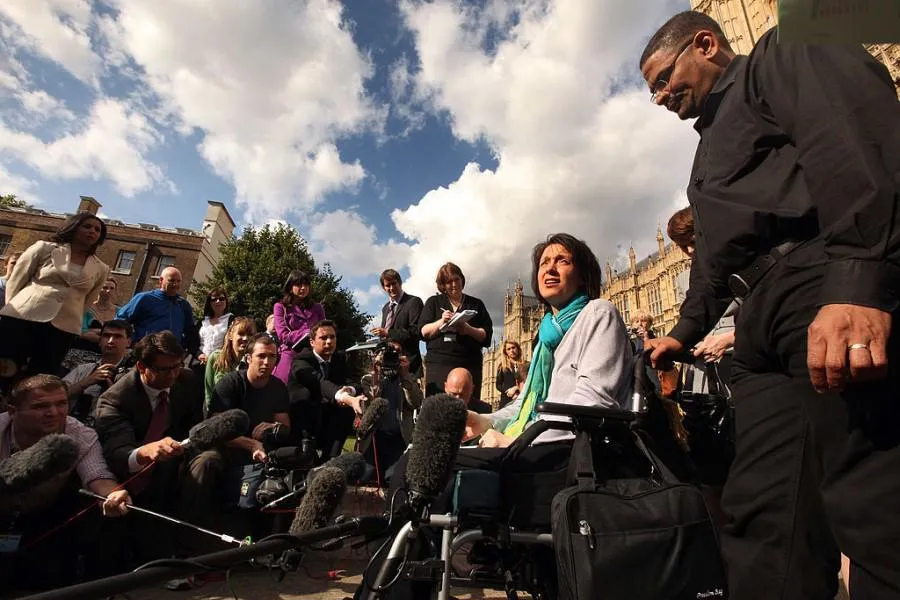Securing advances in LGB equality through strategic litigation
Over the past twenty years, Professor Robert Wintemute, from The Dickson Poon School of Law, has published influential research...
11 May 2022
How do we clarify the law on Assisted Dying? Research by Professor Penney Lewis has contributed directly to legal changes in Australia and Canada, and significantly influenced debates in Ireland, and in England and Wales.
How do we clarify the law on Assisted Dying? Research by Professor Penney Lewis has contributed directly to legal changes in Australia and Canada, and significantly influenced debates in Ireland, and in England and Wales.

22 November 2017: Jaala Pulford is congratulated by Harriet Shing MP and Fiona Patten MP after the Parliament of Victoria’s Upper House voted to pass historic euthanasia laws. Victoria will be the first state in Australia to offer an assisted dying regime. (Photo by Scott Barbour/Getty Images)
The debate on medical assistance in dying (MAiD) – sometimes referred to as physician-assisted dying - raises important questions regarding consent, autonomy, and our criminal justice system, as well as the potential wider impact on society if we allow some individuals to end others’ lives. With MAiD already legal in some countries, and pressure in others to allow patients to opt for physician-assisted death in some circumstances, research by Professor Penney Lewis, from The Dickson Poon School of Law (prior to her appointment as a Law Commissioner) has provided the public, courts and policymakers with an informed critique of the options for regulation.
Her research into the evidence from jurisdictions where MAiD is permitted, conducted over the past 15 years, has demonstrated the importance of the route to decriminalisation; assessed the effectiveness of different legal and regulatory regimes; and successfully challenged a common argument against the practice.
Different paths
Different jurisdictions have found different ways to allow MAiD. In some countries, constitutional courts have found that individuals have a right to end their lives; in others, criminal courts have reinterpreted existing defences to criminal charges; in a third group, specific legislation has been passed.
Evidence from these different jurisdictions provides valuable insights for countries still debating the issue. To interpret this data meaningfully, however, it is essential to understand each approach in the context of the legal framework in which it exists.
Professor Lewis looked at the regulatory systems employed in Belgium, the Netherlands, Switzerland and the US state of Oregon, and assessed the informal, or ‘soft law’, approach adopted in England and Wales.
England and Wales - a ‘soft law’ approach
Assisted dying remains illegal in England and Wales, but the 2010 policy on assisted suicide, published by the Director of Public Prosecutions (DPP) and Crown Prosecution Service, advises against prosecution if “the victim had reached a voluntary, clear, settled and informed decision to commit suicide”, and any person assisting was “wholly motivated by compassion”.

Debbie Purdy, pictured outside Parliament in July 2009. Purdy, who suffered from multiple sclerosis, addressed the media following a historic decision by the Law Lords to clarify the law on assisted suicide.
Where it is suggested assistance was provided, the decision whether or not to prosecute rests with the DPP.
In 2011, Lewis published Informal Legal Change on Assisted Suicide: The Policy for Prosecutors (Legal Studies). She found the system adopted in England and Wales was flawed. Lewis concluded that the system’s focus on those helping, rather than the ‘victims’, together with the apparent desire to avoid appearing to create a regulatory regime, had facilitated suicide in cases that would not have been permitted by most regimes, while also exposing helpers to the risk of prosecution. Elements of the DPP’s guidance, Lewis found, resulted in an “amateur” approach: the involvement of inexpert individuals resulting in a higher risk of botched suicides.
Lewis recommended a twin-track approach, which would shift the focus to assessing cases before suicide is assisted, while also providing stronger scrutiny of cases after the assisted suicide has taken place. This stronger post-suicide scrutiny would still not necessarily result in prosecution.
Assessing a range of safeguards
In 2012, Professor Lewis and Isra Black, co-authored an expert briefing paper for the Commission on Assisted Dying, The effectiveness of legal safeguards in jurisdictions that allow assisted dying.
The authors identified eight types of safeguard, and looked at evidence from The Netherlands, Belgium, Switzerland and the American state of Oregon.
For their conclusions to be meaningful, they argued, the data from these jurisdictions had to be “understood in the context of the different legal and regulatory frameworks in operation in these countries.” Having explained these systems, they looked at the effectiveness of different safeguards in different jurisdictions, and made recommendations on “how these regimes could implement and regulate assisted dying more effectively.”
This briefing paper significantly influenced the debate on policy in England and Wales. In 2013, Lord Falconer, who had chaired the Commission on Assisted Dying, introduced the Assisted Dying Bill into the House of Lords, but the Bill ran out of time due to the 2015 General Election. In 2020, Lord Falconer introduced a new Bill.
A key element in Lewis and Black’s briefing paper had been the rebuttal of the “slippery slope” argument.
The Slippery Slope
Opponents of assisted dying have argued that legalisation is a “slippery slope”, often pointing to the example of The Netherlands.
In The Netherlands, euthanasia has been lawful since the 1970s. Doctors have used a statutory defence of necessity to avoid prosecution in cases where they had provided MAiD, justifying their involvement as a necessary step to prevent suffering.
In the early cases in which the necessity defence was used, the patient had requested MAiD. The same defence was then used to permit MAiD in cases where the patient was unable to communicate.
One of Lewis’ most important conclusions was that the use of the defence of necessity in the second set of cases was not evidence of a slippery slope. Instead, she argued, the two sets of cases were underpinned by the same principle – that Dutch doctors have a duty to relieve suffering. The acceptability of this defence in cases involving an incompetent patient was explained by the Dutch system’s focus on doctors’ duties, rather than patients’ rights.
Based on the data from Belgium and The Netherlands, Lewis’ research also concluded that there was no evidence that legalisation had led to either non-voluntary euthanasia or increases in the overall rate of assisted dying.
The impact of this argument in Canada
In Canada, Lewis’ argument was influential in a landmark decision by the Supreme Court, which led to the decriminalisation of assisted suicide in Canada in June 2016.
Lewis acted as an expert witness for the claimants Kay Carter and Gloria Taylor, both of whom were suffering from degenerative diseases. The claimants argued that the ban on assisted dying ran counter to the Canadian Charter of Rights and Freedoms.
The Canadian Government argued that decriminalisation would make it impossible to protect vulnerable people and that the country would descend into condoning murder.
Lewis’ affidavit drew on her original research, including her rebuttal of the ‘slippery slope’ argument and her evidence from the Netherlands of a decline, since legalisation, of life-ending acts without explicit request. Her affidavit was cited eleven times in the Court’s judgment to rebut the slippery slope argument.
The British Columbia Supreme Court’s decision was overturned on appeal but, in 2015, the Supreme Court of Canada overturned the appeal decision on the basis that since their earlier decision in 1993 in Rodriguez, there had been “a change in the evidence that fundamentally shifts the parameters of the debate”. The Supreme Court of Canada concluded: “… The trial judge, after an exhaustive review of the evidence [which included Lewis’s affidavit], rejected the argument that adoption of a regulatory regime would initiate a descent down a slippery slope into homicide… We find no error in the trial judge’s analysis”.
Since decriminalisation, over 13,000 Canadians have received MAiD, and medical practitioners can prescribe or administer drugs without fear of prosecution.
The Canadian experience has informed the debate in a number of other countries.
In Australia, the importance of Lewis’ research was acknowledged in legislative reports from the Australian States of Victoria and Western Australia, where assisted dying was legalised in 2017 and 2019 respectively. In Ireland, Lewis’s research also provided important evidence for the parliamentary debate on the Dying with Dignity Bill 2020. The Bill, which is currently progressing through the legislature, allows individuals to assist those meeting the qualifying criteria to achieve a dignified and peaceful end of life.